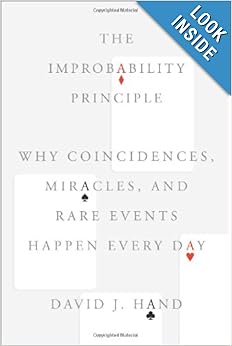 A friend writes to say that Scientific American provides an adapted excerpt from statistician David J. Hand’s new book, The Improbability Principle: Why Coincidences, Miracles, and Rare Events Happen Every Day:
A friend writes to say that Scientific American provides an adapted excerpt from statistician David J. Hand’s new book, The Improbability Principle: Why Coincidences, Miracles, and Rare Events Happen Every Day:
A set of mathematical laws that I call the Improbability Principle tells us that we should not be surprised by coincidences. In fact, we should expect coincidences to happen. One of the key strands of the principle is the law of truly large numbers. This law says that given enough opportunities, we should expect a specified event to happen, no matter how unlikely it may be at each opportunity. Sometimes, though, when there are really many opportunities, it can look as if there are only relatively few. This misperception leads us to grossly underestimate the probability of an event: we think something is incredibly unlikely, when it’s actually very likely, perhaps almost certain.
Hand offers, for example, a really clear explanation of the birthday coincidence: “If there are 23 or more people in the room, then it’s more likely than not that two will have the same birthday.” (Hint: The probability isn’t that you have the same birthday as someone else but that any two people in the room share a birthday. See the calcs.)
Our friend wonders whether Hand will be misunderstood when he writes,
This law says that given enough opportunities, we should expect a specified event to happen, no matter how unlikely it may be at each opportunity.
Visions of checkout counter mag headline: Flimflam rescues Darwin in high stakes drama!

For what it is worth, when defining the complexity of an event, ID theorists take interesting stuff like the birthday coincidence into account, but our friend worries that Darwin’s defenders may not grasp the fact or encourage anyone else to: There is no free lunch.
Follow UD News at Twitter!